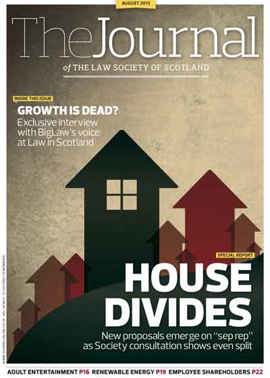Comm prop risks

As was pointed out in a recent article (Journal, June 2013, 38), property and conveyancing intimations, and in particular lender-related intimations, have for some years dominated the Master Policy claims experience, both in frequency and severity (for further details see Marsh’s annual report 2013, available at www.marsh.co.uk/scotlaw).
Although intimations from commercial property transactions are much less frequent than those arising from residential property transactions, commercial property tends to be higher value work and, therefore, claims, when they do arise, tend to be more costly. The main sources of commercial property intimations are issues with securities, titles and leases, and these are now considered in turn.
Security issues
Lender-related claims accounted for the largest number and highest value of commercial property intimations in 2011-12. In contrast to the residential property claims experience, there have only been a handful of commercial property claims where lenders have alleged that solicitors failed to report matters requiring to be reported in terms of their instructions. Most lender-related claims in the commercial property claims experience arise from:
- failure to register securities, including failure to register securities in the register of charges where required;
- failure to achieve the lender’s required ranking.
- In some cases of failure to register, registration may have been overlooked following settlement of a transaction. In other cases, there may have been an issue with the registration of the underlying title.
Risk management systems and controls should include procedures such as a post-settlement checklist for ensuring that: (a) securities and other deeds requiring to be registered are sent for registration, with appropriate monitoring for their return; (b) time limits such as for registration in the register of charges are met; and (c) if deeds are “bounced” by the Keeper on account of some defect, the matter is attended to and the deeds resubmitted promptly.
Lease issues
a) Break notices
In the current economic climate, the exercise of break options has resulted in a number of claims against tenants’ solicitors where the requirements of the lease regarding break notices have not been observed. A “belt and braces” approach is required because, if the landlord wants to resist the break option being exercised, less than 100% compliance with the lease is not good enough.
It is suggested that a comprehensive checklist is the most appropriate risk management control to minimise the risk of these potentially costly claims. Such a checklist should ideally describe not only what checks should be carried out but, as importantly, how, in order to avoid inconsistencies of approach within the firm. For a more detailed examination of how to avoid the most common causes of these claims, see the article entitled “Breaking up is hard to do” by Lindsay Kerr of Zurich Insurance (Journal, September 2009, 42).
b) Rent review notices
Similar considerations apply to the service of rent review notices as apply to the service of break notices. However, other problems can arise from the drafting of rent review clauses, particularly allegations that the clause is ambiguous, does not reflect the clients’ intention, or was not explained to them.
Case study
A firm acted for tenants in taking a lease over commercial premises. The rent review clause provided that the rent would be reviewed (upwards only) every five years, with the rent being reviewed by the greater of 2.5% or the “average prime office rental in the centre of Glendale”. Five years later the landlords sought a 50% increase in rent. They argued that the “prime office rental” in question should be determined by three plush government quango offices recently erected as a result of devolution from Edinburgh. The landlords argued that all other office space (at much cheaper rentals) was no longer in the category of “prime” and should be disregarded. The dispute was referred to arbitration under the lease and the arbitrator awarded a 45% increase. The tenants sued the firm, alleging that they were unaware that such a large increase could have been awarded and that they would not have agreed to the terms of the lease if this had been explained to them.
Risk management controls to minimise the risk of claims of this type might include:
- ensuring you understand your clients’ instructions and intentions;
- ensuring you have discussed all the lease terms with the client;
- drawing the client’s specific attention to any unusual aspects of a rent review clause. What does the client understand to be the basis of the landlord’s intentions? Could this be better expressed (if acceptable to the client), to remove vagueness or ambiguity?
- having the clause checked by a colleague for any vagueness/ambiguity.
Title issues
Claims still arise from failure to obtain rights of access or servitude rights for services. Sometimes these situations can arise from a failure to examine title documentation properly, or because of a drafting error, but they can equally arise because of a failure by the solicitor to anticipate the client’s requirement for these rights, or failure to ask the right questions to prompt the client to provide appropriate instructions.
Many practices use questionnaires to ensure that comprehensive instructions are obtained from clients and that nothing material is overlooked. Variations of the questionnaire can be used for different types of property transaction.
Notwithstanding the introduction of registration of title, disputes concerning boundaries continue to be a source of claims against solicitors:
Case study
Reese Sessions Ltd instructed Frishgroves LLP in late 2010 in the sale of a factory unit which they were disposing of as part of their downsizing strategy. They were retaining an adjacent factory unit, along with two sheds, one used for storage and dispatch, the other housing a generator unit. Unfortunately, after settlement, a dispute arose about whether the sheds were within the boundary of the land conveyed to the purchasers.
Reese Sessions sought declarator that the sheds were not included in the subjects conveyed, and an order that the Land Register be rectified. When this failed, Reese Sessions found that they were unable to use a vital storage facility, or their backup generator, and they made a claim against the firm.
In such situations, the clients should be asked to check that what they expect to be acquired/sold/retained corresponds with the title plan/description, and the client’s confirmation should be obtained and evidenced on the file. If necessary the clients should be advised to engage a surveyor.
For a more detailed consideration of risk management approaches to boundary discrepancies and disputes, see “Know your boundaries” by Tim Edward of Maclay Murray & Spens and Alistair Sim of Marsh (Journal, October 2005, 32).
Russell Lang and Marsh
Russell Lang is a former solicitor in private practice, who works in the FinPro (Financial and Professional Risks) National Practice at Marsh, global leader in insurance broking and risk management. To contact Russell, email Russell.x.lang@marsh.com.
The information contained in this article provides only a general overview of subjects covered, is not intended to be taken as advice regarding any individual situation and should not be relied upon as such. Insureds should consult their insurance and legal advisers regarding specific coverage issues.
Marsh Ltd is authorised and regulated by the Financial Conduct Authority for insurance mediation activities only.
In this issue
- Widening access to the stocks and gallows?
- Family migration revisited
- The same but different
- Controlling tendency
- ESPC: out of the parental home
- Offshore employment: floating goalposts?
- Reading for pleasure
- Opinion column: David O'Hagan
- Book reviews
- Profile
- President's column
- Make the most of your "multiples"
- Sep rep: all to play for
- The bigger they are...
- Licensed to thrill
- Capacity challenge
- One year, and counting?
- Selling your rights... for what?
- The voice of technology
- A serious matter
- Relocation: where are we now?
- Whistle for reform
- Same sex marriage: for richer, for poorer
- Scottish Solicitors' Discipline Tribunal
- Residential property review takes shape
- In-house lawyers seek a rising star
- Mentoring: the way forward
- How not to win business: a guide for professionals
- Comm prop risks
- Ask Ash
- Crossed purposes
- Conference looks for profession to evolve
- Law reform roundup
- Help with the red flags






